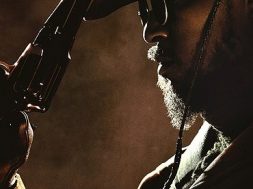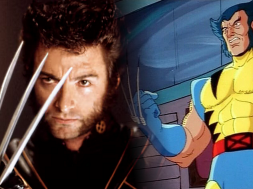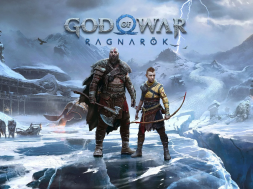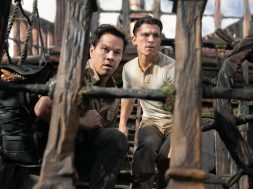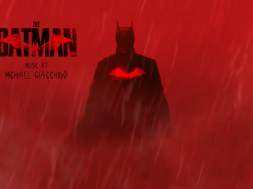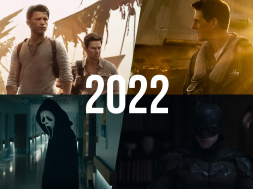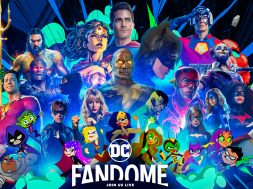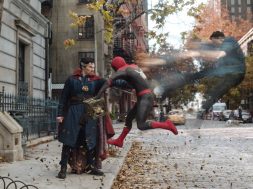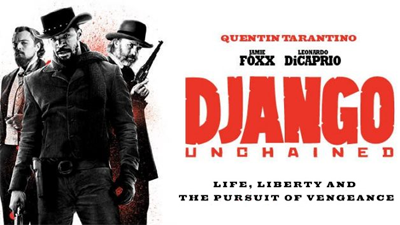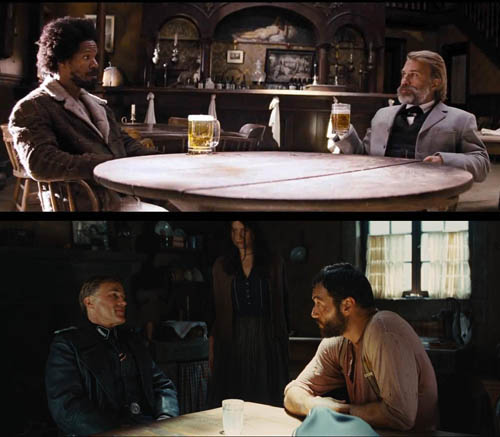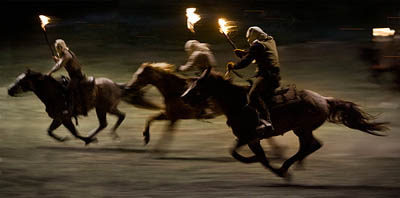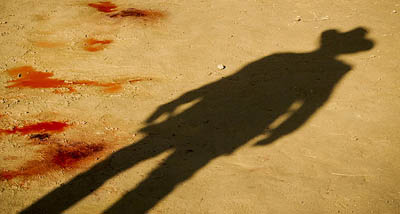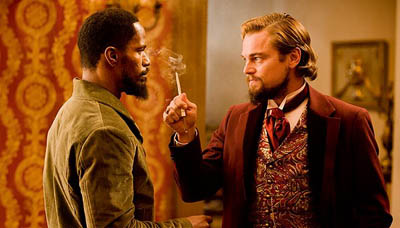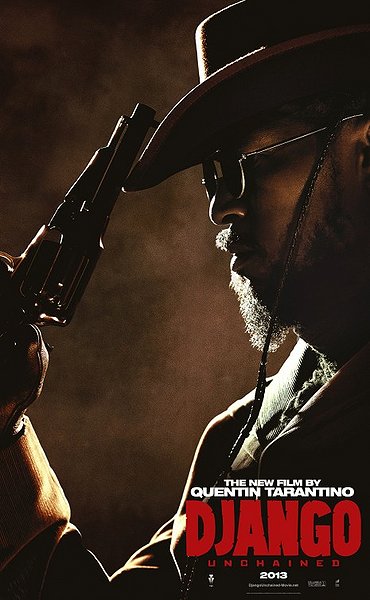
Title: Django Unchained
Starring: Jamie Foxx, Christopher Waltz, Leonardo DiCaprio, Kerry Washington, Samuel L. Jackson
Director/Writer: Quentin Tarantino
Release: January 18th, 2013 (UK & Ireland)
Budget: $100,000,000
Box Office: $257,795,000 (so far!)
A new film from Quentin Tarantino arrived this month, and audiences can be forgiven for not knowing what to expect. The creator behind the only film about World War Two that has a surprise ending is raising the curtain on the United States’ original sin. Filmed as an affectionate homage to the spaghetti western, Django Unchained is raucous, hilarious, visually stunning, and infuriatingly contradictory to watch.
Deep in a forest, late at night (the title card suggests “somewhere in Texas”), a human wagon team of newly purchased slaves are herded by overseers on horseback. As we have now come to expect, an improbable character arrives to upset the scene, this time a German dentist named Dr King Schultz (Christoph Waltz) with an oversized tooth on his wagon and a business proposition for the overseers. He is a bounty hunter and believes a certain Django (Jamie Foxx) can point out three brothers with marked and valuable heads. Schultz takes ownership in glorious fashion, scandalises an entire town by arriving with Django not in chains but on his own(!) horse, and settles down in a now-deserted saloon to discuss terms. He will pay Django handsomely for information leading to the identification of his bounties, once the brothers are dead, he will legally free him. Schultz sits uncomfortably in this position – he claims to despise slavery, but it is very much in his benefit to have Django as a piece of property rather than a paid adviser.
Waltz is effervescent as Schultz, a man who believes that sincerity and reasonable words can transform any situation to the Good. Amiable and liberal-minded, Schultz represents not so much a character as a comfortable and well-spoken friend the audience can cling to during a particularly scary fairground ride. Tarantino is taking us for a walk through darkest Dixie, but he won’t abandon us. You can tell that Christoph Waltz, last seen by most of us in Inglourious Basterds as the charming and driven Colonel Hans Landa, is having an awful lot of fun inhabiting King Schultz – a character divorced from Landa in only a few key respects.
And as we learned from Inglourious Basterds, Quentin Tarantino very much enjoys sitting Christoph Waltz and a bearded man across a well-lit table to have serious funny conversations.
Jamie Foxx, while an admirable actor (see Any Given Sunday or Ray) is given somewhat less to do as Django. Perhaps it is necessary for the slave to be a less complicated character than those who bend themselves around the idea of human slavery, perhaps a driven and straightforward protagonist is needed for Tarantino’s madcap narrative to hang on to. A more interesting slave surfaces later in the film, Samuel L. Jackson’s house slave to a ruthless plantation owner, who personifies the darker parts of the institution – the consent of the owned.
With Django and Schultz as our travelling companions, we are taken for a tour of antebellum America, as told by generations of epics and Westerns. Tarantino is not interested in a historical piece. Emotional rather than objective truth is the currency, buying a spectacular narrative. No one should see this film to get a well-grounded idea of what happened before the Civil War – that film would not make you laugh the way Django does, would not move so fast and smoothly between tragedy and comedy. Instead of a setting of concrete or even apocryphal fact, this is the past as imagined by the ghosts of screenwriters past – a white man’s idea of big-canvas black vengeance. It is well-travelled country. Perhaps the easiest way to sneak brutal racism and sadism past the frontal lobe and straight to the animal centre is to dress it up the way we like our action films, our goofball comedies.
And you will laugh. Halfway through the film I feared that Tarantino had chosen the wrong genre, for the ghost of Blazing Saddles looms large over every white man’s reaction to a freed slave. I challenge you not to think of the final shot of Blazing Saddles during any of the long and beautiful shots of Django and Schultz riding across a majestic landscape (the Warner Brothers backlot has never looked so beautiful). The temptation is just too great. The film is rescued from this by raucous humour and genuine comedy – a scene of Klansmen contemplating how difficult it is to ride a horse and see out of their newly-cut masks is worthy of Mel Brooks. The film has come under fire for the copious use of the word “nigger”*. I can’t see how it can be avoided without losing the sense of place entirely. Like the torture of Zero Dark Thirty – it happened, and the story can’t be told without it. I’m not sure what kind of film those objecting have in mind. Here it’s pleasing to note the circular nature of things. Blazing Saddles was one of the first and certainly most high-profile films to use the word freely (over loud studio objections), and Django Unchained is also criticised for language, while keeping the anarchic and hilarious comedy of the earlier film, almost to the detriment of the serious things it has to say about the American past.
That’s not to say the film pulls its punches in all cases. There are moments of extreme and wrenching violence. Tarantino does not let these occasions stand as only the usual character signposts – though they serve that purpose as well – but they also haunt and drive the film, upsetting a slick familiar style with flashbacks of reality.
Just as in Tarantino’s last offering, Inglourious Basterds, the world is populated with characters larger than their written selves, acting as avatars of Good, Evil, as many deadly sins you can think of and a few you can’t. After a comfortable montage of legalised murder, Schultz and Django arrive finally at Candyland, the most famed plantation of the South (according to Django, who should know), owned and operated by the irresistible and sadistic Calvin Candie (Leonardo DiCaprio). DiCaprio surprises here with a wonderful villainous turn in an unusual supporting role, sucking all the air from the room as Schultz and Django try to trick him. Their caper I’ll leave for the film to explain. A strong theme of the film is Schultz’s growing trust and respect for Django, just as the pair travel into deeper and deeper depths of the slavery state. This itself pays off for Schultz – It’s so strange for anyone to see a black man on a horse being treated like a white man that Schultz relies on this confusion to twist it further, providing a reasonable voice to guide the confused whites through the madness, of course towards his bounty. You may draw your own conclusions at a black slave being manipulated by a man calling himself Dr King.
As a director, Tarantino has been dropping some of the telltale story elements and devices that marked his earlier films. Timelines have remained solid and linear now for two films running, storylines have shrunk down to fewer and longer-lasting characters. Where Basterds assembled various strands of Nazis and Nazi-hunters to a grandiose finale, Django Unchained is contained to a man and his search, letting the history as we know it play out behind. Quickfire dialogue has to become expository rather than verbal set dressing. Perhaps the setting doesn’t allow for it. Our idea of how slaves and slaveowners in 1859 spoke is as close to nonexistent as makes no difference. There can be no arguing over the morals of tipping or what the French call a Big Mac – the camera provides the quotes and tropes that make this a modern film. This is doubtless a good thing. Django revels in creating a beautiful alternative past that allows this particular story to have its middle and end. The beginning we all know. Alternative it certainly is – history as cinema remembers it.
Rating: 8/10
*(Mel Brooks has recently said that the success of Django – combined with it’s bold language – makes his dream of a Blazing Saddles musical possible. If there is ever a reason to go to the movies, this is it folks!)
Words by Paddy English
